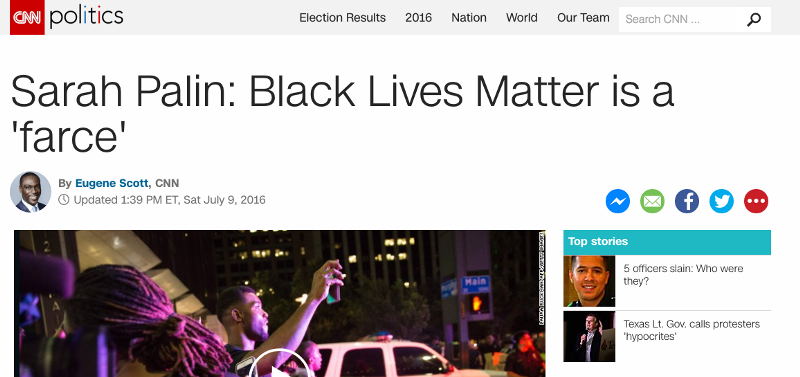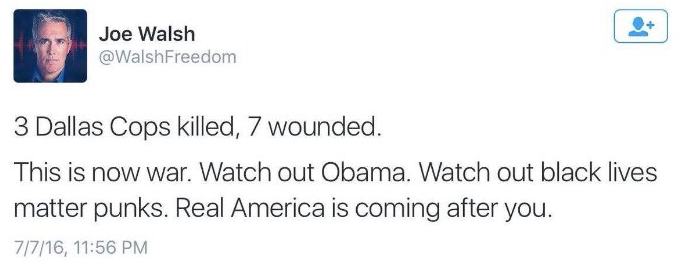
Black lives matter. Saying it out loud is obvious. And important.
Agreeing that Black lives matter does not make one anti-police -- it simply acknowledges that we understand there is a white privilege in the United States that has existed since our foundation.
Having grown up in the U.S. but having lived in Europe for more than a decade gives me a unique perspective to know this problem is more pronounced in America and we have a responsibility to continue to chip away at the problem.
As a white person, I cannot accept that the GOP candidate for office was the leading voice in the United States for the "birther movement," which questioned the citizenship of the president of the United States because his father was from Kenya. If you can't see that and see that we have a racist problem in America that this despicable man won his parties nomination then I think you can't objectively understand the problem.
America in 2016 is no place for "dog whistle" politics and it's time that more people say out loud, "Black Lives Matter" to make sure that the terrible people trying to undermine the movement don't have air cover for continued vitriol, hatred and racism.
It's important to stamp out the overt racism of Sarah Palin (who called Black Lives Matter a farce)...

It's important to stand up to Texas Lieutenant Governor Dan Patrick (who called black protestors
"hypocrites," or to take on the very ugly comments by former congressman and right-wing radio commentator Joe Walsh.

"Real" America? Doesn't he just make the point with one Tweet? Is "Real" America white? And Christian? And hetero?
And Black Lives Matters supporters are Punks? "Watch out Obama?" -- threatening the president of the United States? Inciting violence? And then CNN had the temerity to put this racist on the air. Since hatred always speaks louder than support -- rational people like you and me will be drowned out unless we speak up.
Speaking up is important because even though we haven't walked in the footsteps of our black friends we can show empathy that we support their frustrations and very real struggles.
How can we as a community not speak up? After Eric Garner? Trayvon Martin? Freddie Gray? Alton Sterling? Philandro Castile?
Black lives matter.
I find the movement to say #AllLivesMatter offensive. Of course all lives matter. It doesn't even need to be said. Black Lives Matter doesn't say ONLY Black Lives Matter. It doesn't exclude other people -- it calls attention to the unique prejudices black people face in America. And saying "all lives matter" is a direct attack to say that black people can't unify around their unique problems and grievances.
We need to stop hiding behind the ruse that being pro #BlackLivesMatter means you are anti-police. You can stand with the police while demanding that they treat our African American citizens better.
I see Black Lives Matter as an attempt at: Black unity, creating awareness of the problem and showing the country that there is a problem with how black people are still treated in America. If you take offense to a group trying to call attention to its plight then it's you who have a problem.
Nowhere is the point made more poignantly than the 47-second video below by Jane Elliot in which she poses the question to the (all white) audience 'how many people would be happy to be treated how black people are treated in society?'
She asks those who agree to stand and of course nobody stands, to which she rightly says:
That says very plainly, you know what's happening, you know you don't want it for you, I want to know why you're so willing to accept it or to allow it to happen for others.
We need to stop hiding behind the ruse that being pro #BlackLivesMatter means you are anti-police. You can stand with the police while demanding that they treat our African American citizens better. You can stand with the police while wanting to be sure their leadership feel accountable for the actions of the rank-and-file. That bad behavior won't be tolerated and will be prosecuted.
Of course Micah Johnson who shot many police officers this week in Dallas killing 5 officers is despicable. Of course his actions weaken the movement of pushing for police reform because it hardens those who already refuse to acknowledge change is needed. Of course it's unacceptable and terrible and there are police officers to be mourned.
But a demented person who shoots policemen does not change the fact that we need accountability for our police system and our penal system and need to end the double standards in our society that disproportionally affect people of color.
As President Obama cited from years of research at a speech last week:
- African Americans are 30 percent more likely to be pulled over that Whites
Whatever the origins of these disparities, it is undeniable to say that we have a problem and one that we all own responsibility for both acknowledging and helping to fix.
Like most of you, this week I watched and I read and I shared and I wept (as I watched the 15-year-old son of Alton Sterling crying for his dad) and I mourned and I boiled and I discussed.
It was a terrible week in America.
The video below knocked me out and is so important for people to watch and understand. It's a StoryCorps video about a young black man, Alex Landau, with a white mom and who is stopped for making an illegal left turn and is beaten senselessly by three members of the Denver police without provocation. He has a gun pulled to his head and he hears, "If he doesn't calm down we're going to have to shoot him."
His passenger, who was white, had weed in his pocket and escaped any violence.
When police officers feel it is ok to beat an unarmed person senselessly without fearing that their colleagues will turn them in, you know you have a systemic problem. If you watch this important video it should turn the stats listed above into an individual human narrative of daily injustice that many people of color face in this county.
Talk to any black person in the U.S. and ask about their experiences with the police. I've never met one who didn't at least have one story. It's not acceptable to live in a country where black families have to coach their children how to behave around the police for fear of being killed. Yes, we should all be respectful of police officers -- but this situation clearly goes beyond that.
As a coincidence, even before the recent shootings I had been thinking a lot about race relations in America this past week because I had been watching "OJ Simpson: Made in America" -- a 5-part, 7.5-hour documentary about OJ.
It is the story about OJ's life from childhood in the projects, through high school, his time at USC, his storied football career, his abandonment of the black community, the murder, the trial, his spiraling out of control and ultimately his arrest for armed robbery and sentencing to 33 years in jail.
It is some of the most compelling television I have ever watched. It recounts much of my childhood in the U.S. and growing up an OJ fan but it also presciently captures race relations in America and some of the injustices endured over decades and longer.
The documentary covers the LA police killing of Eulia Love who was arguing over her $22 gas bill and armed with a kitchen knife and the police officers weren't punished. They profile the Rodney King beating in which none of the police were initially found guilty. They cover Latasha Harlins, a teenage black woman who was shot in the back of the head and killed by a grocery clerk who received no jail time. They show LA police chief Daryl Gates defending a police chokehold and saying it only killed black people because they had different attributes than "normal" people. The community started calling cop cars, "Black and Normals."
When your police chief talks like this there is no denying you have a problem.
There is no denying the history of racism in our country brought to the surface again both by the recent police killings and by the ugly, dog-whistle presidential campaign of Donald Trump. "Mexicans are rapists. And some, I assume, are good people" or the overt racism of questioning Obama's citizenship or religion.
It is undeniable to say that we have a problem and one that we all own responsibility for both acknowledging and helping to fix.
Many white, heterosexual, high-income men struggle to speak up on social, racial or gender issues for fear of being targeted for insensitivity. I understand this because when I speak up I try to be careful not to represent that I understand the struggles of people of different color, gender or sexual orientation. I try to be sensitive about not making it my fight or looking for any special recognition for speaking up.
But saying nothing about intolerance or racism is far worse than risking being misunderstood.
I wrote on the topic of black mistreatment in America 18 months ago after Eric Garner was killed and the officers weren't charged. A (white) friend of mine emailed me that he was "shaking his head when he saw the headline of my post" that was titled, "Why I'm Standing Today with My Black American Friends, Family & Colleagues." He then proceeded to tell me that after reading the post he actually felt relieved that I had covered the topic with humility, compassion and open-mindedness.
But why would a friend of mine even second guess me for speaking up or second guess the title of my post? Why wouldn't we ALL speak up? When I hear my non-Jewish friends showing support and sympathy for anti-semitic attacks I feel heart-felt appreciation for somebody acknowledging that Jews are still marginalized in many places in the world -- including America.
When others speak up for me I feel supported.
My father is from South America and I take great offense to Trump vilifying Latinos. I remember my father in tears at one Passover dinner talking about how Latino immigrants are treated in America. He wept for the journey of his friends from Central America coming to the U.S. illegally to escape the violent conditions in that region and saying how much easier he had it arriving legally in the late 1950s.
I feel more supported when people say they won't support trump because they choose country over party. I feel more supported when people stand up to anti-semitism or anti-Latino rhetoric.
So let's not hide behind the fact that we know that of course all lives matter and that without brave policemen we would have no civil society. Of course these things are true and shouldn't have to be said.
That's not the point. The point is that the black community has a right to demand equal treatment in America by our police, by our legal system and by our penal system.
And they have a right to know that they are supported by white people.
#BlackLivesMatter.
***
I would also encourage anybody who wants a depiction of the issues facing the urban communities in America including: drugs, race, policing, the education system, longshoremen, politicians and the press -- there is no greater show ever created in the U.S. than The Wire. It's simply a must watch for every American.
This post originally appeared on Both Sides of the Table.